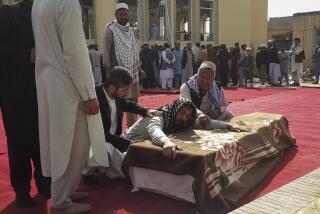Caution on Afghanistan
- Share via
A group of Afghan rebel leaders, meeting with President Reagan last week, urged that the United States break diplomatic relations with the Soviet-sponsored government in Afghanistan and extend diplomatic recognition to the resistance movement. The President called such a move “premature,” and he was right. But later the White House went to great pains to advertise that the door has not been closed on recognition.
This is clearly a case where great caution is in order.
The Afghan guerrillas have earned the admiration of the American people for their courageous struggle against the Soviet forces that invaded the country in 1979. The Soviets, despite superior arms and the use of calculated atrocities against civilians, have not been able to crush resistance. The rebels deserve unstinting American political support and, within the limits of prudence, military hardware that helps their cause.
However, extending diplomatic recognition to the Pakistan-based guerrillas under present circumstances would be a thoroughly bad idea.
As an Administration official told reporters, the guerrilla movement does not yet have “the attributes” of a government. Disunity is rife among the guerrilla leaders, some of whom are extreme Muslim fundamentalists--somewhat akin to the ayatollahs who run Iran--who do not want to have anything to do with the United States. (The rebel chiefs who met with Reagan, in fact, came under immediate attack from two such guerrilla leaders who oppose such contacts.) Equally important, successful as they have been in resisting the invaders, the rebels s imply do not exercise control over the territory of Afghanistan any more than the Soviets do.
Until and unless this situation changes, the disadvantages of recognizing the guerrilla movement as the government of Afghanistan far outweigh the advantages.
To begin with, breaking relations with the puppet government of Afghanistan would mean the abandonment of the American Embassy in Kabul, which is a valuable listening post. More important, such a move would greatly reduce whatever chance there may be of a negotiated Soviet withdrawal.
Reagan is under pressure from some members of Congress to proceed anyway with full diplomatic recognition of the guerrilla movement without waiting for the rebels to acquire “the attributes” of a government cited by the Administration last week. The President should continue to reject such advice. And if the White House staff wants to keep insisting that the door remains open to recognition of a guerrilla government, he should make certain that it is well enough guarded so that nobody can slip through while the policy problems are being thoroughly analyzed.
More to Read
Sign up for Essential California
The most important California stories and recommendations in your inbox every morning.
You may occasionally receive promotional content from the Los Angeles Times.













